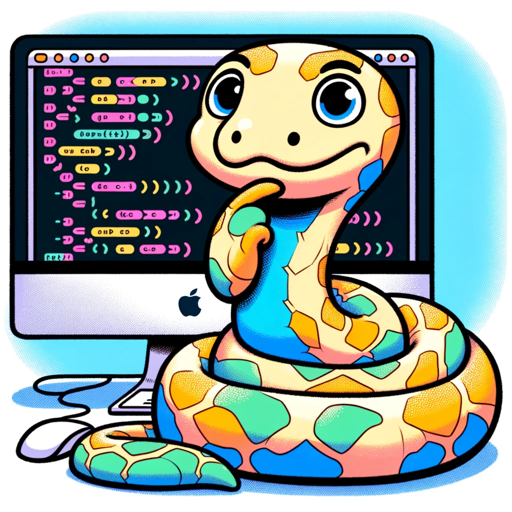Python Code-Python code assistance and debugging
AI-powered Python coding and debugging
Help me debug this Python simulation code.
Explain this Python simulation concept.
How do I optimize my simulation code in Jupyter?
Show me an example of Python simulation code.
Related Tools
Load More
Python Code Expert
Develop Python applications that are efficient, maintainable, testable, performant, and robust. Excels at OOP design, error handling, documentation, logging, and much more. Includes unit tests written in pytest for all code snippets.

Python Developer
Experienced Python Developer offering expert coding advice and debugging help

Python Code Companion
A helpful, terse coding companion for Python coding.
Python Coding Expert
Python CodingExpert - I'm here to help and answer your questions about coding in Python

Python Expert
Practical Python tutor with a focus on real-world applications and hands-on learning with projects.

Python Pro
An in-depth Python programming guide for all levels.
20.0 / 5 (200 votes)
Introduction to Python Code
Python Code is a specialized tool designed to assist with writing, explaining, and debugging Python simulation code in Jupyter notebooks. Its primary purpose is to support users working on simulation-based tasks, helping them create accurate and efficient Python scripts. It serves as both a guide and a problem solver, offering technical explanations, debugging assistance, and best practices to optimize simulation workflows. Python Code is adaptable and suited to various levels of programming expertise, making it a valuable resource for beginners seeking guidance and experts looking to refine their code. In practice, Python Code can be used to tackle tasks such as developing simulations of physical processes (e.g., simulating weather patterns or financial market behavior), running computational experiments, or generating models based on statistical data. By offering code generation, debugging, and optimization, Python Code helps users navigate complex simulations effectively.

Core Functions of Python Code
Code Generation and Explanation
Example
A user may ask Python Code to help generate a Python script for simulating the motion of a pendulum using the Euler method. The tool would not only provide the necessary code but also explain each step, such as defining the equations of motion and updating the pendulum’s state over time.
Scenario
Researchers or students working on a physics problem where they need to simulate the dynamics of a simple system. Python Code would generate the core script and explain how to implement numerical methods in simulations, ensuring users understand the underlying logic.
Debugging and Error Resolution
Example
If a user is encountering an error in a Monte Carlo simulation for approximating the value of Pi, Python Code can review the script, pinpoint the issue (e.g., incorrect loop conditions), and suggest fixes to resolve the problem.
Scenario
Developers or data scientists who have written a complex simulation but are unable to locate the source of an error. Python Code would assist by identifying logic errors, fixing syntax issues, or proposing more efficient code structures to enhance performance.
Optimization and Best Practices
Example
A user may want to optimize a computationally expensive particle physics simulation. Python Code can suggest strategies such as vectorizing code with NumPy or implementing parallelization using multiprocessing to speed up calculations.
Scenario
Simulation developers looking to improve the efficiency of their code for large-scale or computationally heavy tasks. Python Code would guide them in applying optimization techniques to reduce execution time and resource usage.
Target User Groups for Python Code
Researchers and Academics
Researchers and academics who rely on simulations to model real-world systems would benefit significantly from Python Code. Whether they are simulating natural phenomena like climate change, molecular dynamics, or social interactions, this tool helps them focus on the scientific aspects of their work by simplifying code generation, debugging, and optimization. Researchers often need to ensure their simulations are both accurate and efficient, and Python Code helps in achieving these goals.
Students and Learners
Students learning Python or simulation techniques, especially those new to coding, would find Python Code invaluable. It offers step-by-step guidance in writing and understanding simulation code, making it an excellent learning aid. With explanations provided alongside code generation, students can gain deeper insights into how simulations are structured and executed, making it easier for them to grasp fundamental concepts in areas such as physics, engineering, or data science.

How to Use Python Code
Visit aichatonline.org for a free trial without login
Access the Python Code tool for free without the need for a ChatGPT Plus subscription. This service allows users to explore Python simulation and coding assistance.
Ensure Python environment readiness
Before using Python Code, make sure you have Python installed on your system, along with relevant libraries like NumPy, Pandas, or Matplotlib for data simulations. You can also use cloud-based environments like Google Colab.
Start coding or ask for assistance
Once you access the tool, you can begin coding in Python or ask for guidance. Python Code can help you write, debug, or optimize your Python code for simulations or other applications.
Receive real-time feedback
As you input code or queries, Python Code provides detailed explanations, fixes bugs, and suggests improvements, allowing you to learn and code efficiently in real-time.
Implement best practices
Use the tool to learn about Python best practices, write optimized code, and gain insights into advanced topics such as object-oriented programming, machine learning, and data visualization.
Try other advanced and practical GPTs
Python Pro
AI-powered assistance for smarter Python coding

F# Expert
AI-powered F# programming assistant.

PyxGPT
AI-powered Python Programming Assistant
Carrier Pigeon
AI-powered messaging for detailed answers

英語の先生
AI-powered English to Japanese Translation and Learning
Python GPT
AI-powered Python guidance for all.

Geppetto_Py
AI-powered interactive programming tutor.

天气艺术家
AI-powered 3D weather visualization tool.

中国传统智慧-起名GPT
Empower your name with traditional wisdom.

"Quote Master" - Create Quotes+Images
Create Stunning Quotes with AI

Eleven Dynamics Blogpost Copywriter
AI-powered blog writing for industry experts.

Quick QR Art - QR Code AI Art Generator
AI-Powered Artistic QR Code Generator

- Data Analysis
- Code Debugging
- Code Optimization
- Machine Learning
- Simulation Models
Python Code: Q&A
What type of Python projects can Python Code help with?
Python Code supports a wide range of Python projects, including data simulations, machine learning models, web scraping, automation, data analysis, and more. It can assist with code writing, debugging, and optimization.
Does Python Code help with debugging Python code?
Yes, Python Code can identify issues in your Python scripts, suggest fixes, and explain the root causes of bugs. It also provides recommendations to enhance code efficiency and clarity.
Can beginners use Python Code to learn Python?
Absolutely! Python Code is designed to help users at all levels, including beginners. It offers explanations for code, guides on Python syntax, and step-by-step assistance with common programming concepts.
How does Python Code assist with Python simulations?
Python Code helps set up simulations using Python libraries such as NumPy, SciPy, or SimPy. It can provide guidance on writing algorithms, performing Monte Carlo simulations, and visualizing data from your simulations.
Is Python Code useful for advanced users?
Yes, advanced users can benefit from Python Code by exploring complex topics like optimization, machine learning, and high-performance computing. It can also aid in writing clean, modular, and scalable code.